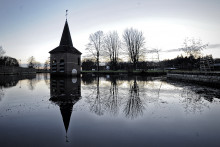`The range of technology can include things like waterless urinals that save water by filtering urine (which is composed mostly of water) through special odourless cartridges. So it is in fact a urinal that does not use any water to `flush' urine away. An even more sustainable approach is composting toilets—where what we generally consider waste is seen as a resource for growing food and plants.' In addition to the unique topic, Owens found the conference more interesting than the typical academic gathering. `People that attend such a conference are enthusiastic and passionate about their work which always makes the event more enjoyable', says Owens. `The day before the conference began we took a field trip to a town called Kangasala- which includes a village where all 9 families built their homes to be energy efficient and sustainable and all included composting toilets.' This field trip clearly showed the benefits of the application in an established Finnish neighbourhood.
Composting toilets are seen as something especially useful in developing countries where they can be installed with little or no infrastructure such as the sewage lines or septic tanks of conventional plumbing. `The ideas are applicable globally for different reasons; perhaps in more developed areas we look to save water, reduce waste and simplify the sanitation systems—this doesn't just apply to rural or developing areas. You have to change your mind about what you see as waste. Part of successfully implementing this technology is a paradigm shift but there are also some real modern technical advances in design that allow built-in units (not just the typical outhouses) to function hygienically with special chambers designed to regulate temperature and air quantity for an ideal active compost pile.' Though a simple technology in essence, the conference gave attendees the chance to compare innovations and hear presentations about successes and failures not just in design but also in implementation.
The conference included a great diversity of attendees: a members of a Swedish tourism board (the technology is particularly suitable for national parks, wilderness areas, or vacation homes), as well as representatives from governmental and academic institutions in Japan, Germany, Mexico, Canada, the U.S., Finland, Norway, South Africa, and the United Kingdom. It included a French environmental entrepreneur who supplied composting toilets for concerts and outdoor events.
Owens: `Another important application is in disaster situations, the Norwegian Red Cross gave an enlightening speech about uses in temporary refugee camps during disasters or conflicts. Dry toilet technology is certainly not only about developing countries; I like to think that people will look back 100 years from now and laugh at the way we ran so much water through a system just to remove waste that can otherwise be so beneficial.'

Katharine Owens sits in demo model of composting toilet.







